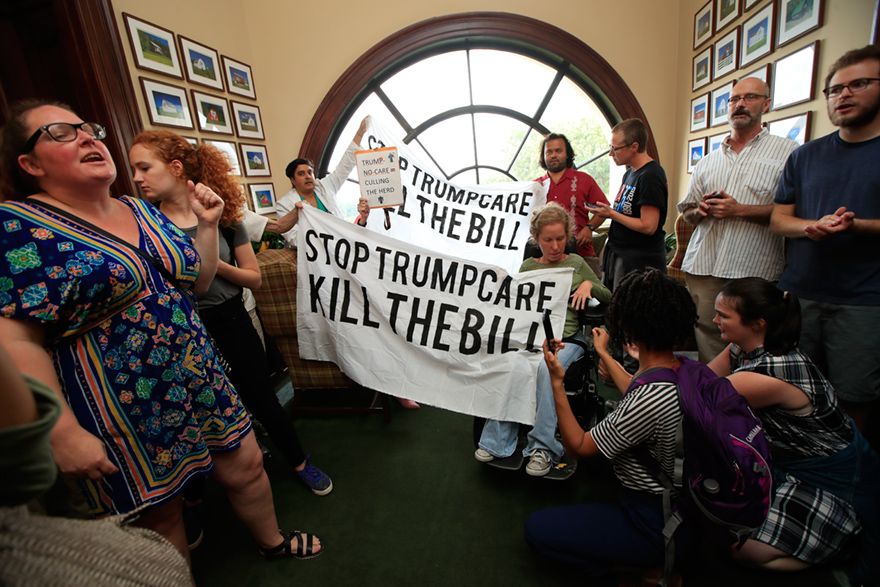Trump’s Presidency Fuels Conservatism’s Decline
 The GOP’s embarrassing defeat on health care underscores that liberalism is still winning even with unified Republican control of government.
The GOP’s embarrassing defeat on health care underscores that liberalism is still winning even with unified Republican control of government.
epublicans may hold the presidency, healthy majorities in Congress, and a deferential Supreme Court. But as the GOP’s embarrassing health care defeat shows, conservatism is in retreat—and no amount of postgame recriminations will change the fact that many Senate Republicans didn’t live up to their party’s longtime goal of reducing the scope of government.
Presidents set the tone for their party’s direction. President Trump, until recently a big-time donor to Democrats, never campaigned on rolling back entitlements. He found a receptive Republican constituency by pledging not to cut Social Security, Medicare, and Medicaid. His lack of interest in the details of health care reform and lackluster sales job of a top legislative priority stunted its chances from the outset. Of his numerous tweets, only a small fraction focused on his party’s efforts to roll back Obamacare. It’s no coincidence that even Republican voters were lukewarm about the repeal-and-replace efforts, according to polling.
The most significant development in the health care exercise occurred when Republican leaders determined that it was politically untenable to go back to a system in which people could be denied health insurance because of a preexisting condition. That, in itself, was a major concession. Obamacare’s complicated bureaucracy of taxes, mandates, and subsidies were all designed to ensure that insurance companies could make a profit while covering sicker patients. From this point on, Republicans were conceding that health insurance is a right that government must provide—a point that Republicans fought aggressively during the original Obamacare debate.
There are plenty of credible arguments that Republicans could advance to make the case for an Obamacare rollback. They could argue that public spending on health care crowds out necessary resources for other priorities, notably infrastructure, education, and tax cuts. They could point to studies showing that expanding Medicaid consigns its recipients to narrow networks of doctors and poor health outcomes. They could have made an economic argument that the law’s arbitrary mandate requiring businesses with over 50 employees to offer health insurance stunts growth. But few advocates of the Republican approach tried to make a free-market case for rolling back Obamacare, instead insisting that more people would be covered as a result of the GOP’s reforms.
Once Republicans got trapped into playing the opposition’s game—that the quantity of coverage is more important than the quality of coverage—they were already playing a losing hand.
The only Republican senators to appear on last week’s Sunday news shows were Rand Paul and Susan Collins, the two main GOP opponentsof the legislation. No other senator was represented in support of the administration’s efforts. It wasn’t for lack of trying: Conservative talk-show host Hugh Hewitt told me on his radio show that Republican senators didn’t want to come on and defend the health care legislation.
But placing the blame on messaging masks the real reason why Republicans couldn’t pass Obamacare repeal: Government benefits, once established, are nearly impossible to roll back. Out of power, Republicans could attack all the law’s flaws without grappling with the reality that the rising premiums they railed against subsidized sicker, lower-income beneficiaries. Now that they are in charge, Republicans don’t have the appetite to advocate rolling back those benefits in order to reduce costs. “As I have said, I did not come to Washington to hurt people,” Sen. Shelley Moore Capito of West Virginia said.
What’s most telling about the collapse of TrumpCare is that the highest-profile defectors were senators not facing immediate political pressure. Aside from Sen. Dean Heller in Nevada, none of the GOP skeptics were up for reelection next year. Sen. Lisa Murkowski of Alaska and Capito represent the most Trump-friendly states in the country. Republican Sen. Rob Portman of Ohio, a longtime fiscal hawk, isn’t on a ballot for another five years. The two Republicans who sealed its demise—Sens. Jerry Moran of Kansas and Mike Lee of Utah—hail from deeply conservative strongholds.
For the GOP, there was no better time to jam unpopular legislation through Congress. Many vulnerable House Republicans already voted to support replacing Obamacare. Even an anti-Trump tsunami next year would be unlikely to hand Democrats a Senate majority, thanks to the GOP’s favorable map. The window to pass consequential legislation through Congress is closing fast—and perhaps forever.
There’s a recent historical parallel to a president who failed to take advantage of fortuitous circumstances. Jimmy Carter was elected during a period of conservative ascendance (1968-1992). Despite holding Democratic majorities in Congress, he clashed with his party’s leaders on Capitol Hill and failed to accomplish much. He left office giving way to the Reagan revolution. His presidency is now seen as a small Democratic blip in a sea of conservative victories.
So far, Trump’s administration is mixing the corruption of Richard Nixon with the incompetence of Carter. That may be all liberalism needs to launch a comeback.
https://www.nationaljournal.com/s/655536/trumps-presidency-fuels-conservatisms-decline

best steroid for muscle mass
References:
https://khmerhd.tv/
best steroids for sale
References:
guanli.jiance.cn